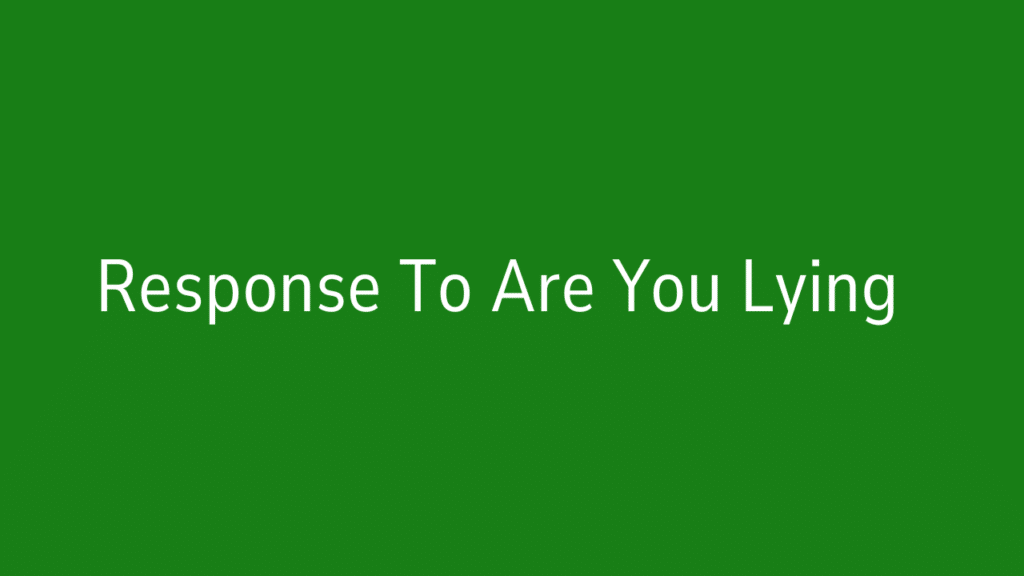When confronted with the question, “Are you lying?”, it can be a tense and tricky situation. The way you respond will impact how the conversation unfolds. Here, we’ll look at multiple approaches for answering this question, whether you’re telling the truth or dealing with accusations unfairly.
1. How to Respond to “Are You Lying?”
Stay Calm and Composed
Remaining calm is key in any tense situation. Overreacting might make the accuser think you’re hiding something.
- Response 1: “I understand why you might think that, but I assure you, I’m telling the truth.”
- Response 2: “I’m staying calm because I know I’m being honest.”
- Response 3: “I’m not lying, I’m just trying to explain myself clearly.”
- Response 4: “Let me explain again. I’m completely honest with you.”
- Response 5: “I’d never lie to you, and I want to make sure you understand where I’m coming from.”
Clarify the Question
Asking for clarification can buy you time to respond thoughtfully, and sometimes it helps the accuser reframe their question.
- Response 1: “Can you explain why you think that?”
- Response 2: “What specifically makes you feel that way?”
- Response 3: “I’m not sure I understand your concern, can you clarify?”
- Response 4: “Could you point out where my story seems inconsistent?”
- Response 5: “I’m happy to talk more, but could you explain what led you to ask that?”
Answer Honestly
If you’re not lying, stick to the truth without hesitation. Confidence in your honesty can help others believe you.
- Response 1: “No, I’m not lying. Everything I’ve said is the truth.”
- Response 2: “I wouldn’t lie to you. This is exactly what happened.”
- Response 3: “I’m being upfront with you, no lies here.”
- Response 4: “I’m not hiding anything, I’m just telling you the facts.”
- Response 5: “That’s not the case at all; I’m speaking honestly.”
Acknowledge Their Concern
Empathizing with their perspective shows you care about their feelings while also standing by the truth.
- Response 1: “I understand why you might feel that way, but I’m being truthful.”
- Response 2: “I see how you could be confused, but I promise I’m not lying.”
- Response 3: “I get that it seems strange, but I assure you, I’m not lying.”
- Response 4: “It’s okay to be doubtful, but I want to reassure you I’m honest.”
- Response 5: “I can see where you’re coming from, and I’d like to clear up any misunderstandings.”
Provide Evidence (If Applicable)
If you have proof or supporting details, offering them calmly can help back up your claim.
- Response 1: “I’ve got a receipt here if you’d like to see it.”
- Response 2: “If you want proof, here’s the document that confirms what I’m saying.”
- Response 3: “I can show you the text messages that explain everything.”
- Response 4: “Here’s the video that shows what happened, if you need further clarity.”
- Response 5: “I have the email from last week that confirms what I told you.”
2. How to Respond if You’re Accused Unfairly
When accused of lying unfairly, you may feel frustrated or upset. Here are five ways to respond calmly and productively:
Ask for Specifics
If the accusation feels baseless, ask for specifics to understand their reasoning.
- Response 1: “Can you point out what part of my story seems untrue?”
- Response 2: “Why do you think I might be lying about this?”
- Response 3: “Could you tell me what made you feel I’m not being honest?”
- Response 4: “What part of my statement made you think I’m not being truthful?”
- Response 5: “I’d really like to understand what led you to believe that.”
Stay Firm in Your Truth
Don’t back down from your truth, even if someone doubts you. A strong, consistent response can reassure others of your honesty.
- Response 1: “I am confident that what I’m saying is true.”
- Response 2: “I’m not changing my statement because it’s honest.”
- Response 3: “I’ve explained everything already, and I’m standing by my words.”
- Response 4: “I’ve given you the truth, and I’m not going to apologize for it.”
- Response 5: “I’m not lying, and I’ll keep repeating the truth if necessary.”
Offer to Discuss Further
Sometimes a calm, open discussion can clear up any misunderstandings.
- Response 1: “If you’d like, we can talk more about this, and I’ll clear up any confusion.”
- Response 2: “I’m happy to explain again if something’s unclear.”
- Response 3: “If you want to know more details, I’m happy to provide them.”
- Response 4: “I’d love to keep talking and make sure there’s no misunderstanding between us.”
- Response 5: “Let’s sit down and discuss this more, so we can resolve it.”
Don’t Engage in a Back-and-Forth
Avoid getting into a drawn-out argument. If the accusation is clearly false, it’s often best not to engage in a prolonged debate.
- Response 1: “I’m not going to argue about something that’s not true.”
- Response 2: “I’ve explained myself; continuing this conversation isn’t helping.”
- Response 3: “There’s nothing more to say; I’m telling the truth.”
- Response 4: “I don’t want this to turn into a conflict. I’ve been honest.”
- Response 5: “If you choose not to believe me, that’s on you, but I know I’m being truthful.”
Offer a Sincere Apology if Necessary
If you did make a mistake or miscommunicate something, owning up to it can help rebuild trust.
- Response 1: “I’m sorry if what I said caused confusion. Let me explain again.”
- Response 2: “I didn’t mean to give the wrong impression. I apologize if I did.”
- Response 3: “I didn’t realize how my words might come across. I’m sorry for the misunderstanding.”
- Response 4: “If I made a mistake or misspoke, I apologize. I’m here to clarify.”
- Response 5: “I see how that might not have sounded right, and I’m sorry if it seemed like I wasn’t being truthful.”
3. Table: Dos and Don’ts When Responding to “Are You Lying?”
| Dos | Don’ts |
|---|---|
| Stay calm and composed | Overreact or get angry |
| Respond directly and honestly | Over-explain your point |
| Show empathy and understanding | Blame the accuser |
| Ask for clarification if needed | Avoid answering altogether |
| Provide evidence if applicable | Accuse them of lying in return |
Why It’s Important to Respond Properly
How you respond to being asked, “Are you lying?” has significant implications on your reputation, relationships, and how others view you. Let’s look at why it matters:
- Rebuilding Trust: Your response can either help or hinder the process of rebuilding trust.
- Maintaining Integrity: How you handle accusations will either strengthen or damage your credibility.
- Avoiding Conflict: A calm, thoughtful response prevents unnecessary arguments and confusion.
- Defusing Tension: Handling the situation with grace can prevent a potentially uncomfortable situation from escalating.
- Strengthening Relationships: Honest and respectful communication can lead to stronger bonds in the long term.
Final Thoughts
Responding to the question, “Are you lying?” is about maintaining composure and providing clear, honest answers. Whether you are being falsely accused or are genuinely speaking the truth, your response can make all the difference. Keep calm, stand firm in your truth, and seek to understand the perspective of the person asking. By handling the situation with empathy and clear communication, you can resolve misunderstandings and preserve your integrity.



